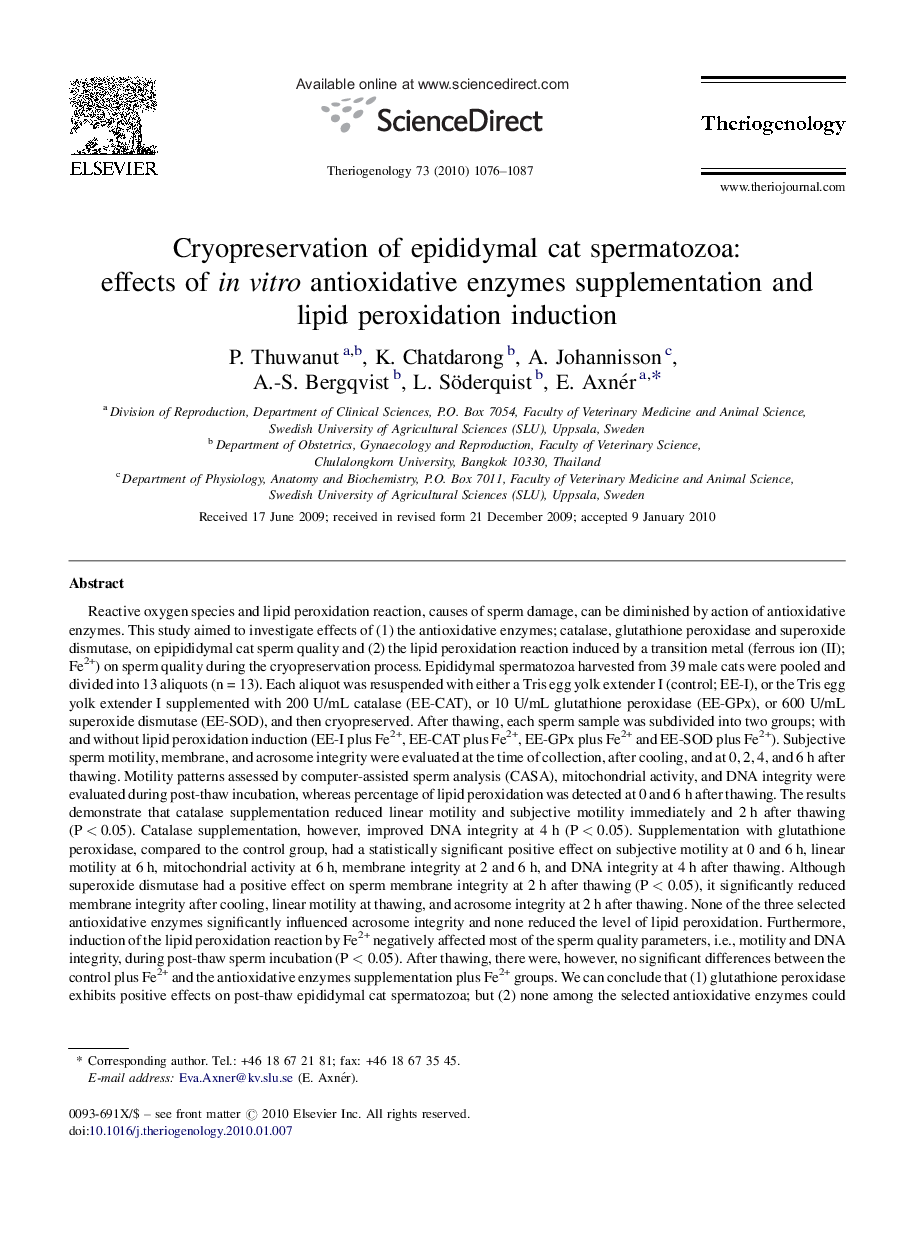| کد مقاله | کد نشریه | سال انتشار | مقاله انگلیسی | نسخه تمام متن |
|---|---|---|---|---|
| 2097897 | 1082572 | 2010 | 12 صفحه PDF | دانلود رایگان |

Reactive oxygen species and lipid peroxidation reaction, causes of sperm damage, can be diminished by action of antioxidative enzymes. This study aimed to investigate effects of (1) the antioxidative enzymes; catalase, glutathione peroxidase and superoxide dismutase, on epipididymal cat sperm quality and (2) the lipid peroxidation reaction induced by a transition metal (ferrous ion (II); Fe2+) on sperm quality during the cryopreservation process. Epididymal spermatozoa harvested from 39 male cats were pooled and divided into 13 aliquots (n = 13). Each aliquot was resuspended with either a Tris egg yolk extender I (control; EE-I), or the Tris egg yolk extender I supplemented with 200 U/mL catalase (EE-CAT), or 10 U/mL glutathione peroxidase (EE-GPx), or 600 U/mL superoxide dismutase (EE-SOD), and then cryopreserved. After thawing, each sperm sample was subdivided into two groups; with and without lipid peroxidation induction (EE-I plus Fe2+, EE-CAT plus Fe2+, EE-GPx plus Fe2+ and EE-SOD plus Fe2+). Subjective sperm motility, membrane, and acrosome integrity were evaluated at the time of collection, after cooling, and at 0, 2, 4, and 6 h after thawing. Motility patterns assessed by computer-assisted sperm analysis (CASA), mitochondrial activity, and DNA integrity were evaluated during post-thaw incubation, whereas percentage of lipid peroxidation was detected at 0 and 6 h after thawing. The results demonstrate that catalase supplementation reduced linear motility and subjective motility immediately and 2 h after thawing (P < 0.05). Catalase supplementation, however, improved DNA integrity at 4 h (P < 0.05). Supplementation with glutathione peroxidase, compared to the control group, had a statistically significant positive effect on subjective motility at 0 and 6 h, linear motility at 6 h, mitochondrial activity at 6 h, membrane integrity at 2 and 6 h, and DNA integrity at 4 h after thawing. Although superoxide dismutase had a positive effect on sperm membrane integrity at 2 h after thawing (P < 0.05), it significantly reduced membrane integrity after cooling, linear motility at thawing, and acrosome integrity at 2 h after thawing. None of the three selected antioxidative enzymes significantly influenced acrosome integrity and none reduced the level of lipid peroxidation. Furthermore, induction of the lipid peroxidation reaction by Fe2+ negatively affected most of the sperm quality parameters, i.e., motility and DNA integrity, during post-thaw sperm incubation (P < 0.05). After thawing, there were, however, no significant differences between the control plus Fe2+ and the antioxidative enzymes supplementation plus Fe2+ groups. We can conclude that (1) glutathione peroxidase exhibits positive effects on post-thaw epididymal cat spermatozoa; but (2) none among the selected antioxidative enzymes could improve all sperm quality parameters; and (3) the lipid peroxidation reaction may be one cause of post-thaw epididymal sperm damage in cats, but the concentrations of antioxidative enzymes used in this study could not protect cat spermatozoa from lipid peroxidation induction.
Journal: Theriogenology - Volume 73, Issue 8, May 2010, Pages 1076–1087